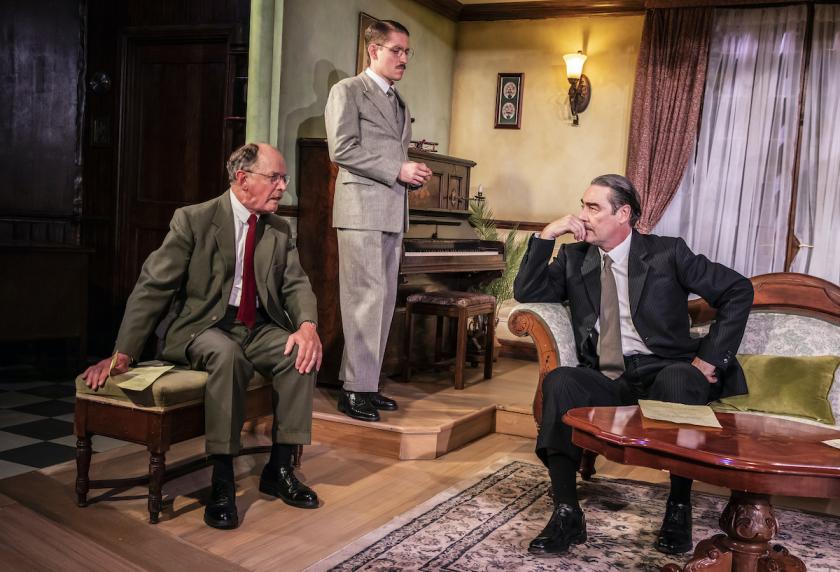Must science always be dominated by politics? This question is most urgent when the stakes are high – climate change or nuclear weapons. And it is grimly true that the fact that audiences are still interested in the race for the atom bomb between the Allies and Nazi Germany in the 1940s says something about our current anxieties about Russia, North Korea and Iran.
Billed as the “other side of the Oppenheimer story”, American playwright Alan Brody’s award-winning 2013 history play, Operation Epsilon, gets its British premiere at the Southwark Playhouse, and offers a solid, if pedestrian, account of how German nuclear scientists were influenced by political considerations during the Third Reich.
Set in Farm Hall, Cambridgeshire, from July 1945 to January 1946, the story shows how 10 of Germany’s most important physicists, including Nobel laureates, were sequestered by the British and how their conversations were monitored to see how far they had advanced in the creation of Hitler’s own atom bomb. Although their outraged reaction to the dropping of the American bomb on Hiroshima shows that they were nowhere near to achieving the same success, their protestations of innocence are undercut by the evidence of their conversations. The Germans, led by Otto Hahn, claim to have been developing nuclear power for peaceful use, but it is soon clear that its application for warfare had certainly been considered.
 Based on actual transcripts of secretly recorded conversations, Operation Epsilon stages the tensions between the 10 scientists. The main characters are Hahn and Werner Heisenberg – whose ambiguous role in the development of the German nuclear programme is familiar to anyone who remembers Michael Frayn’s Copenhagen (1998) – while others include Max von Laue, who was less involved in the nuclear race, and Walther Gerlach – whose preference for gardening over physics gives a slightly amusing slant to the proceedings. Their younger colleagues, such as Carl Friederich von Weizsäcker and Erich Bagge each have individual reasons for their anger at confinement. Meanwhile, British army Major Rittner acts as narrator and the men’s considerate jailer.
Based on actual transcripts of secretly recorded conversations, Operation Epsilon stages the tensions between the 10 scientists. The main characters are Hahn and Werner Heisenberg – whose ambiguous role in the development of the German nuclear programme is familiar to anyone who remembers Michael Frayn’s Copenhagen (1998) – while others include Max von Laue, who was less involved in the nuclear race, and Walther Gerlach – whose preference for gardening over physics gives a slightly amusing slant to the proceedings. Their younger colleagues, such as Carl Friederich von Weizsäcker and Erich Bagge each have individual reasons for their anger at confinement. Meanwhile, British army Major Rittner acts as narrator and the men’s considerate jailer.
With such a large cast it’s hard to keep track of all the strands of this complex story, but central to the proceedings is their self-appointed leader, Heisenberg. Although he is a brilliant theoretical physicist, he is responsible for the failure of the German atom bomb project because he insisted that his calculations showed that such a device was impractical and could not be manufactured. When he discovers that the Americans have created a nuclear bomb he tries frantically to work out where his own maths went wrong. He also aims to argue that he was never mistaken, but that he deliberately misled Hitler into thinking that the bomb was not worth pursuing.
At the same time, Hahn is tortured by the realization that his success in discovering uranium fission was a significant step in the development of this monstrous weapon, but also reminds us of his role in saving the life of physicist Lise Meitner, who was Jewish – the nuclear success of exiled German Jewish scientists in America is contrasted with the failure of Nazi knowledge. His colleagues, who include party members, are however more worried by their own postwar life chances than by any ethical issues. The play clearly shows how political considerations, such as Hitler’s racism and anti-Jewish policies, had a major effect on scientific research.
Brody tells the story in a straightforward way, hampered a bit by the need for exposition, and with little in the way of fun to relieve the nervy claustrophobia of these prisoners of war. Some lighter moments, such as Heisenberg’s piano playing or the raucous party to celebrate Hahn’s winning of the Nobel prize, as well jokes about gardening and the bitter rivalry between the men, do little to alleviate the testosterone heaviness of this all-male show. By the end, after Max von Laue criticizes the whole Nazi project, it is one offstage female who delivers the sharpest verdict on their inhumanity, their failure not only as scientists but as people.
New York-based Andy Sandberg’s production is designed by Janie E Howland on a two-level set which stretches along the wide stage of the Southwark’s basement Elephant space. Attractively representing an English country house of the previous century, the set emphasizes the confinement of the Germans, and the limitations of the venue. The solid cast – especially Gyuri Sarossy’s Heisenberg (pictured above), Nathaniel Parker (Hahn), Simon Chandler (Von Laue), Jamie Bogyo (Von Weizsäcker) and Matthew Duckett (Bagge) – keep the clashing personalities on the boil and, however plodding, this tenth anniversary production is a sincere addition to the genre of ethical debates about science and politics.















Add comment